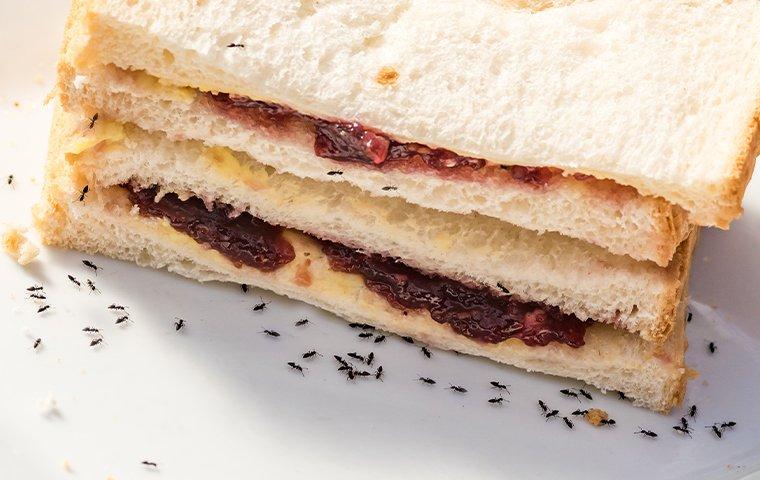Nestled among rivers and greenery, St. Charles offers a slice of paradise for its residents. But every paradise has its quirks, such as pesky ant invasions that can disrupt our homes—ignoring the issue is not an option. It's crucial for a healthy home to tackle it head-on. That's precisely why ant control in St. Charles holds such importance. It directly impacts your family's health and your home's structural integrity. So, let's delve into how to keep these tiny intruders at bay and make your home truly ant-free.

Types Of Ants That Commonly Invade Area Homes
Knowing your enemy is fundamental, especially when that enemy is an ant intruding on your St. Charles home. Different ant species in St. Charles can cause varying levels of trouble, and each requires a specialized approach. In this guide, we'll dive deep into the types of ants most likely to make an unannounced visit.
Carpenter Ants
Carpenter ants are relatively large, often black, and can grow up to half an inch long. They're not wood-eaters like termites; instead, they hollow out wood to make room for their colonies. This tunneling activity weakens wooden structures in your home, such as door frames and cabinetry, making this ant type a quiet but significant threat.
Fire Ants
Though small and reddish-brown, fire ants can deliver a powerful and painful sting that can cause allergic reactions in some people. They love warm, sunny conditions and can construct mounds in your yard, making outdoor activities risky. Once outside your house, it's a short journey to the indoors, particularly if food is accessible.
Sugar Ants
Sugar ants have a penchant for sweets and are primarily nocturnal creatures. They'll gravitate to sugary spills, unsealed food items, and sometimes pet food. While not dangerous, they can quickly become a bothersome presence in your kitchen or pantry.
Pavement Ants
These ants frequent areas around patios or sidewalks and are dark brown to black. They have a particular attraction to greasy foods, and if you often grill or eat outdoors, you may find them an unwelcome addition to your picnic.
When you know these specific types of ants, you're already ahead in the game of keeping your St. Charles home ant-free. Each species comes with its own set of challenges but also its own solutions.
Why Ants In The House Can Be So Problematic
Ants may seem like a small issue, but let's not underestimate their impact. Whether carpenter ants gnawing at your wooden frames or fire ants stinging your toddler, the problems are real. An ant infestation can throw a wrench in your daily life in more ways than one.
Hygiene Concerns
When ants march into your home, they don't come alone. These tiny invaders can carry bacteria in from the outside, depositing it on your food, utensils, and countertops. What people often overlook is that ants can contaminate more than just your food. They can walk over your toothbrush, cutlery, and even pet food. Plus, if you have young children who tend to drop food or spill liquids, ants can quickly compromise the cleanliness of play areas, increasing the risk of bacterial infections and making these insects a legitimate concern for the health of your household.
Property Damage
Carpenter ants, in particular, are a homeowner's stealthy enemy. They create complex tunnel systems in wooden structures—often hidden away where you can't easily spot them. Over time, this weakens the integrity of wooden elements like door frames, windowsills, and floorboards, potentially leading to expensive repairs. On the other hand, fire ants create disruptive mounds in your garden or yard, affecting both the aesthetics and usability of outdoor spaces.
Allergies And Bites
Fire ant stings can cause more than a sharp pain; they can lead to an allergic reaction for those who are sensitive. Symptoms can include hives, shortness of breath, and, in extreme cases, anaphylaxis—a potentially life-threatening reaction. Even for those without allergies, the stings are painful and can result in uncomfortable rashes or infections if not treated promptly.
Overall Disruption In Living Conditions
Ants aren't just a kitchen problem; they can infiltrate other areas of your home as well. From spoiling pantry items to making a home in your potted plants, their pervasive nature can disrupt daily activities. You might end up spending valuable time cleaning and recleaning areas, inspecting food items before use, or even losing sleep knowing ants are roaming freely.
Proactive Measures To Keep Ants Out Of The Home
If you want to maintain an ant-free home, being proactive is essential. Let's talk about some actionable ant prevention tips that are not only effective but also simple enough to integrate into your daily routine.
Proper Food Storage
When it comes to attracting ants, food is the main culprit. But it's not just about sealing your leftovers. Even the smallest crumbs can attract a parade of ants. Opt for airtight containers for dry goods, and don't overlook items like honey, syrup, or even cooking oils. If you have a pet, seal their food bags tightly or keep the kibble in a bin with a lid. Also, regularly inspect less obvious places like under the microwave or toaster where crumbs can accumulate.
Regular Cleaning And Maintenance
While it may seem obvious, a clean home is far less appealing to ants. But this isn't just about your daily or weekly cleaning routines. Monthly deep cleanings help target hidden corners that regular cleaning might miss. Check and clean kitchen appliances that can hold food remnants, like ovens, microwaves, and refrigerators. Don't forget the less obvious areas, like under sinks or behind toilets, as even the tiniest water leak can attract thirsty ants. Clearing gutters and trimming back plants touching your home each season can also remove additional pathways for ants to come in.
Sealing Entry Points
It's essential to close the entrances ants can use to enter your home. While cracks in doors and windows are common entry points, look for less obvious routes. Electrical outlets, cable connections, and even attic vents can serve as hidden highways for ants. Consider using a silicone-based caulk for smaller gaps. Expanding foam sealant can do the trick for larger holes, particularly those in basements or attics. Also, pay special attention to the areas where utility pipes enter the home; a small gap is all ants need to come indoors.
Natural Remedies And DIY Solutions
For those interested in less traditional methods, several natural remedies can be effective:
- Cinnamon: Ants aren't fans of cinnamon. Sprinkle ground cinnamon around entry points as a natural deterrent.
- Vinegar: A 50/50 mix of water and vinegar can mess with an ant's sense of smell and direction. Spray it on surfaces where you often see ants.
- Lemon Juice: The strong scent can disorient ants, making it harder for them to navigate. Wipe down surfaces with lemon juice to keep them away.
- Cornmeal: Ants are attracted to cornmeal but can't digest it. Once ingested, it disrupts their digestive system, making it a natural ant control method.
- Coffee Grounds: Used coffee grounds placed near entry points can serve as a barrier. Ants dislike the smell, making it an effective repellent.
- Peppermint Oil: This strong scent overwhelms ants and masks the scents that attract them. Apply a few drops to cotton balls and place them where ants frequent.
Feel free to mix and match these remedies to see which combinations work best in keeping ants at bay.
These ant prevention tips can go a long way in ensuring your home remains a no-go zone for ants. Taking these proactive steps can save you both time and potential headaches down the line.
Total Ant Control For St. Charles Homes
To truly keep your home ant-free, you'll need more than just DIY solutions and natural remedies. For a robust defense against these persistent pests, consider adopting a comprehensive approach to professional home pest control in St. Charles.
Importance Of Professional Pest Control Services
While home remedies are great, they are often temporary solutions. A professional pest control service can provide a long-lasting solution, identifying and treating the root causes of your ant problem. These experts can thoroughly inspect, recommend targeted treatments, and provide valuable insights to prevent future infestations.
Scheduled Inspections
Seasonal changes can impact ant behavior, making periodic inspections essential. Having a professional inspect your home during the transition to every new season can help you adapt your ant control methods. These inspections can spot early signs of infestation and address them before they escalate.
Periodic Treatments
Regular follow-up visits are crucial to ensure the ants don't return even after an initial treatment. Depending on the severity and type of infestation, treatment schedules can vary. A consistent treatment plan, customized to your home's specific needs, is the most effective way to maintain an ant-free environment.
Call Pest Control Consultants Today
Taking the fight to the ants requires a well-planned strategy, and that's where Pest Control Consultants come in. Our team offers a range of services to ensure ant removal is thorough and lasting. From scheduled inspections to targeted treatments, we've got your back.
 Customer Reviews
Customer Reviews
